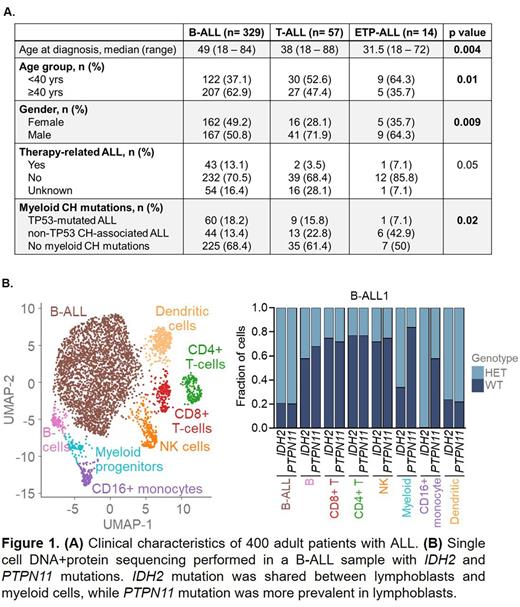Abstract
Acute lymphoblastic leukemia (ALL) represents 20% of adult leukemias. Genomic risk stratification of ALL relies on the data generated from large cohorts of pediatric and young adult patients, where older patients with ALL have been underrepresented. It is imperative to understand the unique leukemogenic pathways in this group in order to develop novel therapeutic approaches.
Clonal hematopoiesis (CH) is a precursor lesion for development of myeloid leukemias and mature lymphoid neoplasms (Niroula, Nat Med 2021), but its impact on the biology and outcomes of ALL is unknown. Based on our observations on high incidence of myeloid mutations in older adults with ALL, we hypothesized that CH constitutes a fertile genomic background for lymphoblastic leukemogenesis, and ALL with myeloid mutations is a unique entity with distinct clinical and molecular characteristics.
We studied 400 adult patients with ALL treated at the University of Chicago, Moffitt Cancer Center, and City of Hope between 2014 and 2022 (Fig 1A). Genetic profiling of pre-treatment bone marrow samples was performed with a comprehensive panel covering 147 myeloid and lymphoid genes. Overall, 33% of ALL cases had at least one myeloid CH-associated mutation with the following frequencies: TP53 (18%), DNMT3A (5%), TET2 (4%), ASXL1 (3%), RUNX1 (3%), IDH2 (2%), BCORL1 (2%), U2AF1 (1%), CUX1 (1%), BCOR (1%), CBL (1%), and SF3B1 (1%). We further investigated the association between mutations and clinical variables by calculating the odds-ratios (OR) with adjustments for multiple testing by using the Benjamini-Hochberg method. Myeloid CH mutations in TP53, DNMT3A, TET2, and ASXL1 genes were more common in older adults with ALL. Mutations in TP53 and DNMT3A were enriched in therapy-related B-ALL group (OR 2.6, 95% CI= 1.3-5.5, q= .007 and OR 4.7, CI= 1.2-18.1, q= .01, respectively), and were more commonly associated with hypodiploid (OR 7.1, 95% CI= 1.5-32.7, q=.004 and OR 5.2, 95% CI= 0.6-48, q=.1, respectively) and hyperdiploid (OR 5.9, 95% CI= 2.7-13.1, q=<0.001 and OR 3.9, 95% CI= 1.1-16.5, q=.04, respectively) cytogenetics. We stratified the ALL cohort into three groups: TP53-mutated ALL, non-TP53 CH-associated ALL, and ALL without myeloid CH mutations. Patients in both groups of CH-associated B-ALL had worse overall survival (OS) than patients without myeloid CH mutations (median OS, 23 vs 25 vs 48 months, respectively, p=.001). In a multivariable analysis of OS for B-ALL, adjusting for age and therapy-related ALL, both TP53 (HR 1.95, 95% CI=1.2-3.17, p=.006) and non-TP53 myeloid CH (HR 1.95, 95% CI=1.14-3.35, p=.01) were associated with worse OS.
Based on the data indicating high allelic frequencies of myeloid CH mutations in ALL, we hypothesized that these mutations are ancestral events arising in HSCs. To gain insights into the clonal architecture, we performed single cell DNA+protein sequencing using the Mission Bio, lnc platform. Data from 4,180 cells obtained from a CH-associated B-ALL patient are shown in Fig 1B. Cells were clustered by immunophenotype, and mutations were overlayed into 8 clusters. IDH2 R140Q mutation was shared between ALL and myeloid compartments. PTPN11 mutation was more prevalent in B-lymphoblasts. We observed a similar pattern in 7 additional patients, indicating that both lymphoblasts and non-malignant myeloid cells share CH mutations in ALL patients.
Next, we investigated whether CH can be detected as a precursor lesion prior to ALL. In a patient with therapy-related B-ALL, a TET2 CH clone was detectable 5 years prior to ALL, and additional SF3B1 and CDKN2A mutations were detectable at the time of B-ALL diagnosis. We confirmed the presence of these mutations in B-lymphoblasts by single cell sequencing. This patient had persistent TET2/SF3B1 mutated CH despite achieving remission from B-ALL. We observed a similar pattern in four additional patients, for whom the CH mutations were detectable several years prior to their ALL diagnosis and were present in the dominant ALL clone.
Collectively, these data support a model in which ALL can arise from pre-existing clones harboring myeloid CH mutations in a significant fraction of older adults. ALL with myeloid mutations is a distinct clinicopathologic entity with inferior survival outcomes. Future studies may decipher mechanisms driving lymphoid bias of CH-mediated leukemogenesis that can be targeted to prevent and treat ALL.
Disclosures
Aldoss:Autolus Limited: Consultancy; Amgen: Consultancy; Agios: Consultancy, Honoraria; Jazz Pharmaceuticals: Honoraria, Speakers Bureau; Kite: Consultancy; AbbVie: Consultancy, Research Funding. Luskin:Pfizer: Honoraria; Abbvie: Research Funding; Novartis: Research Funding. Knepper:The Jackson Labortatory: Consultancy. Venkataraman:American society of Hematology: Honoraria; EUSA Pharma: Speakers Bureau; Wolters-Kluwer: Patents & Royalties: Royalty for editor of a book, $1000 for 2021. Patel:Kronos Bio: Research Funding; Pfizer: Research Funding; Servier/Agios: Research Funding; Celgene/BMS: Research Funding; AbbVie: Consultancy. Odenike:Abbvie; Impact Biomedicines; Celgene; Novartis; BMS; Taiho Pharmaceutical; CTI; Threadwell therapeutics; Bristol-Myers Squibb/Celgene (Inst): Consultancy; Celgene (Inst); Incyte (Inst); Astex Pharmaceuticals (Inst); NS Pharma (Inst); Abbvie (Inst); Janssen Oncology (Inst); OncoTherapy Science (Inst); Agios (Inst); AstraZeneca (Inst); CTI BioPharma Corp (Inst); Kartos Therapeutics (Inst); Aprea AB (Inst): Research Funding. Larson:Amgen: Consultancy; Epizyme: Consultancy; Takeda: Consultancy; Astellas: Consultancy, Research Funding; Immunogen: Consultancy; BMS: Consultancy; CVS/caremark: Consultancy; MedPace: Consultancy; MorphoSys: Consultancy; Novartis: Consultancy, Research Funding; Servier: Consultancy; Daiichi Sankyo: Research Funding; Rafael Pharmaceuticals: Research Funding; Gilead: Research Funding; Celgene: Research Funding; cellectis: Research Funding. Ebert:Celgene: Research Funding; Deerfield: Research Funding; Novartis: Research Funding; GRAIL: Consultancy; Skyhawk Therapeutics: Membership on an entity's Board of Directors or advisory committees; Exo Therapeutics: Membership on an entity's Board of Directors or advisory committees; TenSixteen Bio: Current equity holder in private company, Membership on an entity's Board of Directors or advisory committees. Shah:Servier: Other: grants and investigator-initiated trials; PeproMene Bio: Other: Steering committee; Autolus: Consultancy; Century Therapeutics: Consultancy; Adaptive: Consultancy; Pharmacyclics: Consultancy; Beigene: Consultancy; Acrotech: Consultancy; Jazz: Consultancy, Other: grants and investigator-initiated trials; Precision Biosciences: Consultancy; Kite/Gilead: Consultancy, Other: grants and investigator-initiated trials; BMS/Celgene/Juno: Consultancy; Novartis: Consultancy; Pfizer: Consultancy; Amgen: Consultancy. Stock:Kura Oncology: Honoraria; MorphoSys: Honoraria; Pfizer: Consultancy, Honoraria, Research Funding; Pluristem: Consultancy, Honoraria; Servier: Honoraria; Syndax: Consultancy, Honoraria; Kite: Honoraria; Jazz Pharmaceuticals: Honoraria; Amgen: Honoraria; Agios: Honoraria; Newave Pharmaceuticals: Consultancy.
Author notes
Asterisk with author names denotes non-ASH members.


